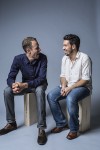Joel Bernbaum and Kayvon Kelly are good friends who’ve drifted apart in My Rabbi. (photo by Derek Ford)
Religion, family, even something as innocuous as a book club or a sports team – any group to which we belong creates an “us” and a “them.” Conversely, for most of us, not belonging anywhere, with anyone, leads to feelings of isolation, desperation. Finding space for “the other,” being secure in oneself, these basic building blocks of healthy relationships, are at the core of My Rabbi.
When interviewed last month by the Jewish Independent (jewishindependent.ca/at-foundation-of-my-rabbi-is-friendship) co-creators Kayvon Kelly and Joel Bernbaum expressed the hope that their two-man play would raise more questions than it answers. It certainly does.
The opening scene shows both men praying, Arya (played by Kelly) on his knees to Allah, Jacob (Bernbaum) adorned in tallit and tefillin to Hashem. Arya and Jacob are not religious extremists, however. Both have turned to religion in part because of the relationship they had with their respective fathers, they are both seeking meaning, but both still live in Canada, by choice – in Toronto no less, one of Canada’s most multicultural cities – Jacob a Conservative rabbi, Arya still searching. They have drifted apart by the time the play begins and, when they happen to bump into each other again, the timing could not be worse – a synagogue in Toronto has just been bombed.
This awkward reintroduction leads to a reunion over coffee and flashbacks to earlier, happier days of their friendship. Frat-boy humor offers breathing room in this intense 60-minute play, as, in addition to the current-day tensions, we see Arya and Jacob interacting with their fathers (each played by the other actor) in some emotional, identity-defining scenes. We witness how/why Jacob becomes a rabbi with a strong sense of religious affiliation and Arya becomes more of a lost soul, his sense of identity not as clear.
There is little female presence in this play. We find out that, while Arya’s father was Muslim, his mother was Catholic, but other than sexist jokes at the pub about bar conquests, and catching up on the latest girlfriend status, women don’t play a large role in these men’s lives.
The easiest assumption to make between this play and the larger world is that it is a commentary on the Israeli-Palestinian conflict or the larger “clash of civilizations” between extremist Islam and the rest of Islam and the West. However, these characters could belong to any group (religious or not) that leans to the insular.
And, it’s not really about this group versus that group, but about human beings in general, how a question asked at the wrong moment can end a years-long friendship, how selfish we can be in our own fear. It’s about how we relate to each other, our susceptibility to outside forces, our evaluation of our self-worth.
While based on Kelly and Bernbaum’s own cultural backgrounds, it almost would have been nice if they had chosen characters that didn’t already come with so much baggage. As the discussion after a Victoria show proved, we come to the play – as we come to anything else – with our own preconceptions, and even though the play is intended to elicit openness, some will find it hard to empathize with Jacob (i.e. Jews) or Arya (i.e. Muslims). There is such a strong human tendency, it seems, to lay blame.
The title of the play doesn’t help in this regard, as it sets viewers’ expectations higher for the rabbi. And, it’s misleading, as the play is not more about Jacob than Arya, Judaism over Islam. It’s about two friends, any two friends, and it would be a shame if the play were considered relevant only to the Middle East conflict or how Jews and Muslims as groups may interact. Kelly and Bernbaum are asking us to consider our own personal motivations, actions and reactions, and are asking us to put ourselves not only in Jacob and Arya’s places and consider what we would have done, but what we – not someone else – should have done.
My Rabbi is at Firehall Arts Centre from Oct. 7-18.

